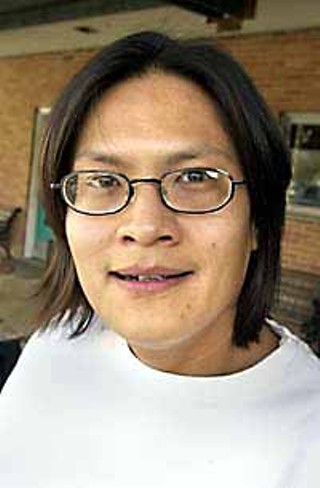Native Talent
UT filmmaker's short "Yada Yada' to screen at Sundance
By Marjorie Baumgarten, Fri., Dec. 28, 2001

Bennie Klain is heading out to Utah this January to attend the Sundance Film Festival, where his eight-minute short film "Yada Yada" has been selected for official presentation. The movie is a concise yet provocative study of racial attitudes, especially in regard to Native American populations, in the context of pre- and post-9/11 America. When the 29-year-old Klain is done with his Sundance premiere, he will head back to Austin to begin his senior year as an undergraduate in the Department of Radio-Television-Film at the University of Texas.
"Yada Yada," which is only the second film Klain has ever made, in fact began as a class project. In keeping with the subject matter of the course -- Synch Sound -- Klain staged the film in a radio station announcer's booth, wired with phone lines, that he discovered in the Department of Journalism. The movie's setup features a local talk-show host who needles his on-air callers and vice versa; everything was shot in real time. Going into the project, Klain knew that what he wanted to do was establish the bickering cultural antagonisms that drove his characters. What he didn't know, however, was how to end the film, how to bring these characters to an understanding of the ultimate triviality of the differences among them: native Austinites fighting with the city's newer arrivals and Native Americans fighting with the Anglo usurpers of the land. And then "about two or three days after September 11," Klain declares, "it hit me." A news bulletin alerts the characters to the sudden attack on the World Trade Center, and the shared impact "nulls out" the racial disharmony that had preceded it.
As a beautiful a cappella version of "The Star Spangled Banner" plays over the closing credits, "Yada Yada" continues its provocation. The tune is familiar, but the words are not. The American national anthem is being sung in a foreign tongue. Another few bars go by, and the average viewer realizes that the anthem is being sung in Navajo, which of course must be recognized as an indigenous language. In its brief eight minutes, "Yada Yada" has elegantly challenged the cultural baggage and assumptions that underpin the inbred grievances of American life. As the radio deejay and the callers are stunned into silence, so too are the film's viewers.
Not bad for a student filmmaker. But that's not all. Next month's trip to Sundance will be the second time Klain has been invited to the prestigious festival to show a film. He was there in 2000 with a documentary he co-produced, "The Return of Navajo Boy." Directed by Jeff Spitz, "Navajo Boy" uses some "found" documentary material to recover one indigenous family's history amid the Monument Valley of the American imagination, its image sealed by all the John Ford Westerns that used the area's distinctive geography to such dramatic advantage.
Klain, who is a member of the Navajo Nation, attributes his good fortune in part to the Sundance Institute's commitment to presenting a Native Forum at each year's festival. Rather than resisting the segregation that arrangement might confer, Klain welcomes the opportunity. "The Native American sidebar is a good opportunity for a lot of people, and it's so ignored. Some people debate that all the Native American films should be mixed in with the other ones. But it also opens a lot of doors for many people. Chris Eyre, who directed the multi-award-winning Smoke Signals, and Sherman Alexie, who wrote that film, both have films in the festival this year, and they both had to start somewhere. It's a great opportunity for someone like me."
Prior to entering film school, Klain worked as a news reporter for commercial Arizona radio station KTNN, which is licensed to the Navajo Nation. While there, he anchored three Navajo-language newscasts daily. At another radio station he produced the award-winning Native American music program Windsongs. Klain credits his years as a bilingual journalist with helping him hone his skills as a storyteller: He learned the Navajo language before learning to speak English, and he also learned how to structure information into stories before learning to make films. It's Klain's ability to straddle and transcend the various cultures he inhabits that make his perspective so unique. "What a lot of people don't understand," he says, "is that if you're talking about Native Americans, you have to talk about America. This identity didn't happen by choice, but this is the reality we live in."










